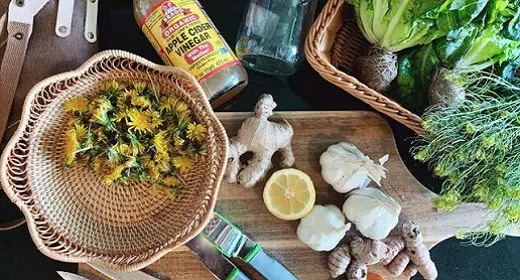by Dana Hutchinson: Learn more about the role of foods for gut health and protective immune homeostasis…
For centuries, health practitioners have debated the origin of disease presentation in the human body. More than 2,000 years ago, the famous Greek physician Hippocrates claimed that “all disease begins in the gut.” Modern adaptations of this quote affirm that microorganisms in our gastrointestinal tract have an essential role to play in the regulation of human health. These microorganisms (known as the gut microbiota and more recently termed the “microbiome”) are responsible for the production of vitamins, the maturation of the immune system, and preventing pathogenic bacteria from colonizing in the gut (Lyon, 2017).
Most of the human microbiota resides in the gastrointestinal (GI) tract, along with 70-80% of the body’s immune system! As the immune and GI cells have evolved together to terminate harmful pathogens, they demonstrate a symbiotic partnership that actively assists one another to achieve system homeostasis. With most of our population suffering from an inadequacy of beneficial bacteria and an excess of harmful bacteria, we are seeing an enormous rise in diagnosed inflammatory conditions across the nation. Building upon my previous explanation of autoimmune conditions, this article will delve into the purpose of our gut microbiota, its integral importance in maintaining immune system stability, and ways you can support your GI system with helpful herbs, food for gut health, supplements, and more.
Our Unique Microbiome
The human GI tract hosts 10-100 trillion microbial cells that represent more than 400 cultivable species ranging from viruses, protozoa, bacteria, fungi, and archaea. Surprisingly, there are approximately 50-100 times more organisms in the microbiome than the entire human genome (Hooper & Gordon, 2001)!
This unique micro-organism colonization takes place at birth with multiple factors influencing the vibrancy and diversity of the intestinal flora development. Environmental exposures, antibiotics, the type of birth, method of feeding, and traumatic events can all influence the numbers and species of micro-organisms that colonize our gut. These factors also dictate the differentiation of four epithelial cells, which are responsible for absorbing nutrients, forming our protective mucus layer, releasing hormones, and secreting defense peptides (Gersemann et al., 2017).

As the microbiota develops, organisms begin to influence and interact with our mucosal immune system, central nervous system, endocrine system, gut epithelium tissues, and other bacteria (Gill & Guarner, 2004). The vitality of our microbiota also determines our susceptibility to infections. Healthy microbiome organisms help to prevent pathogenic bacteria from attaching to our mucosal walls while also maintaining our proper intestinal pH (ranging from pH 1.5 in the stomach, to pH 8 in the small intestine). The microbiota is also responsible for outcompeting internal pathogens for nutrients, resulting in ‘starving’ the pathogen and eliminating it from the body. By reducing our exposure to inflammatory agents, we can balance our delicate ecological systems and reduce our vulnerability to immunoinflammatory diseases like autoimmune conditions. A healthy microbiome yields a robust immune system and a well- functioning digestive system that can properly metabolize an array of vital nutrients.
Gut Permeability AKA “Leaky Gut”
The buzz word, “leaky gut”, has gained popularity in the 21st century among natural health practitioners, patients, and researchers; an interesting term awarded to a gut mucosal environment that has an abnormal amount of intestinal permeability. The layer of epithelial tissues in our intestinal wall are naturally semi-permeable to allow the passing of micronutrients from the gut into the bloodstream. Although porous, these tissues inherently prevent microbes and antigens from leaving the gut membranes. In a leaky gut presentation, we have epithelial tissues that are hyperpermeable, damaged, and/or lacking integrity, which grants the previously contained pathogens and undigested larger food molecules a free passage through the gut-blood barrier. As these toxins and food antigens begin to leak directly into the bloodstream, the immune cells immediately identify the particles as “foreign” and initiate an attack on the substances to protect the system. Our activated T and B cells attempt to destroy the foreign particles by producing antibodies towards them. Unfortunately, as the immune system begins to send out more and more inflammatory signals to fight the invaders, systemic inflammation takes over and autoimmunity can soon follow.

Common symptoms of leaky gut can include bloating, weight gain, migraines, eczema, anxiety, fatigue, depression, hair loss, joint pain, allergies, and flatulence. These symptoms should not be considered normal although they have been deemed ‘common’ in our society.
Root Triggers of Gut Imbalance
It is our belief at the Wildflower Clinic that exposure to antibiotics, environmental toxins, a deficient diet (Standard American Diet), repeated consumption of food intolerances, chronic stress, over-the-counter medications, underlying infections, and poor genetic microbiota flora are the main causes of most digestive complications and intestinal inflammation (gastritis). Vulnerability to these factors can increase our risk for developing a gut flora bacterial imbalance (intestinal dysbiosis). This can lead to gut inflammation, nutrient malabsorption, bacterial overgrowth, poor digestion, and intestinal permeability. If left untreated, these chronic issues usually progress over time and develop into systemic inflammation, severe food sensitivities, insulin resistance, liver stagnation, severe digestive issues, and more commonly autoimmunity.

Consumption of anti-nutrients like dairy, corn, gluten, and processed foods (to name a few) can contribute to increased gut permeability due to their inherent inflammatory properties and nutritional composition. Chronic alcohol consumption, mild traumatic brain injuries, and underlying infections also play a large role in negatively affecting our intestinal barrier function. Lactobacillus is highly suppressed when we consume alcohol, intestinal permeability increases after trauma to the brain, and infections like Helicobacter pylori can directly influence epithelial permeability by redistributing proteins in the gut wall and allowing bacteria to flow into the rest of the system (Autoimmune Conditions, 2019). Other infections that can disrupt the intestinal lining include Candida, Salmonella, Giardia, Shigella, Blastocystis hominids, and Yersinia (Paray et al., 2020).
Immune Homeostasis
The gut and the immune system are partners in keeping the body healthy. We know that an increase in gut permeability creates an easy passage for bacteria to enter the bloodstream and engenders a systemic immune response. These immune responses can contribute to intestinal inflammation, which can serve as a catalyst for the development of autoimmune diseases such as multiple sclerosis (MS), inflammatory bowel disease conditions (celiac, ulcerative colitis), type 1 diabetes, celiac disease, and systemic lupus erythematosus (Paray et al., 2020).
With a low number of healthy microbes in the gut intestine, the immune system may struggle to fully develop and/or defend the body against dangerous pathogens, whilst ultimately becoming hypersensitive (ex: allergies, histamine reactions, or autoimmunity).
The microbiome acts as the epithelial lining gatekeeper and a response trainer for immune cells to distinguish between foreign pathogens and our own human tissues. Thus, in a healthy interaction, the gut supports healthy immune responses and in exchange, the immune system works to populate the microbiome with anti-inflammatory (beneficial) microbes. Put simply, any abnormalities in communication between our epithelial tissues and our immune cells can lead to mistaken autoimmune responses and the inability to effectively fend off toxins.

Let’s Heal
Fortunately, epigenetic research shows that we can alter our gene expression and influence our microbiome diversity (Sharma, 2020). Removing food intolerances (foods that cause internal inflammation) can be an advantageous start to healing damaged or inflamed epithelial intestinal cells. Here at the Wildflower Clinic, we suggest doing our elimination challenge to figure out which foods may be contributing to any systemic issues. It is imperative to eliminate all processed foods, sugars, and additives from the diet in addition to incorporating warmer foods.
Traditional Chinese Medicine
In Traditional Chinese Medicine (TCM), warm foods help to aid digestion, whilst raw (cold) foods are thought to damage the spleen and stomach meridians, which are essential for proper absorption, a healthy appetite, and regular bowel elimination. When picking beneficial foods for gut health, focus on appropriate levels of antioxidants, flavonoids, and fiber (think red cabbage, broccoli, soaked flax seeds, cilantro, parsley, and berries).
Starting your morning with 16 oz. of warm filtered water with ½ squeezed lemon and 30 drops of trace minerals can help to balance your system’s PH, wake up the digestive system, and keep inflammation levels controlled. Light exercise and movement should follow. Qi Gong, tai chi, yoga, stretching, or gentle walking can help to calm the mind, invigorate the spirit, and reset the stress response system (HPA axis).
Supplementation can also be favorable for gut permeability by filling nutritional voids that may reside in the system. We suggest L-glutamine, zinc, NAC, magnesium, and probiotics as supplemental considerations.
TCM has always emphasized the importance of gut health to generate Qi (vital force), which nourishes the entire body. TCM views illness as a direct result of a dysfunction of Qi and therefore supports the entire body, rather than only focusing on the treatment of the dis-ease presentation itself. Classic Qi deficiency symptoms can include constipation, diarrhea, abdominal pain, cold hands/ feet, insomnia, hair loss, sinus congestion, and headaches (Umeda, 2019). In a leaky gut presentation, TCM practitioners would look to harmonize the digestive system by supporting the Spleen and Kidney meridians. Herbs that are supportive for invigorating Spleen Qi can include astragalus ‘Huang Qi’, don quai ‘Dang Gui’, and licorice root ‘Gan Cao.’. Herbs that can be considered for fostering Kidney Qi are rehmannia ‘Shu Di Huang’, cordyceps ‘Dong Chong,’ and goji berries ‘Gou Qi.’
Curious about investigating your microbiome? There are some testing mechanisms that claim to offer a reflection of your intestinal microbiota. We suggest looking into a GI Effects or GI-MAP test to better understand your commensal bacterial abundance and any gut dysbiosis patterns.
Herbs for Gut Health 101:
Let’s examine some common botanicals that can help to reinforce our gut integrity, calm digestive disturbances, and revitalize our digestive function.
1. Chamomile (Matricaria recutita)- this panacea powerhouse herb is renowned for supporting gut membranes that have been damaged due to inflammation. Chamomile is used primarily as a digestive aid and a systemic anti-inflammatory herb.
2. Calendula (Calendula officinalis)- this bright-orange flower is often underestimated in the gut department. Calendula is used for its ability to soothe the gut intestinal wall and intestinal wounds/ulcers while delivering beneficial carotenoids/flavonoids to the system.
3. Marshmallow (Althaea officinalis)- this mucilaginous-rich herb is renowned for bringing moisture to dry mucous membranes. Marshmallow is used for its antibacterial activity and its ability to soothe inflamed membranes across the entire gastrointestinal tract.
4. Plantain (Plantago major)- this versatile plant is one of the best herbs for all types of internal or external swelling. Plantain is used to support inflamed gut intestinal tissue and provide dietary fiber.
5. Peppermint (Mentha spp.)- this common mint has great benefits for the gut. Peppermint is used to reduce flatulence, balance intestinal PH, and calm symptoms of irritable bowel syndrome (IBS).
6. Dandelion (taraxacum offcinalis) flowers from the fields of Colorado. Dandelion flowers, leaves, and roots are used at the Wildflower Clinic to support a healthy digestive system.

Disclaimer:
*Please ensure you are working with a qualified registered herbalist before beginning any herbal protocol. These recommendations do not replace regular medical care with your licensed doctor and do not intend to diagnose, treat, prevent, or cure any condition. These statements are not evaluated by the FDA.










































